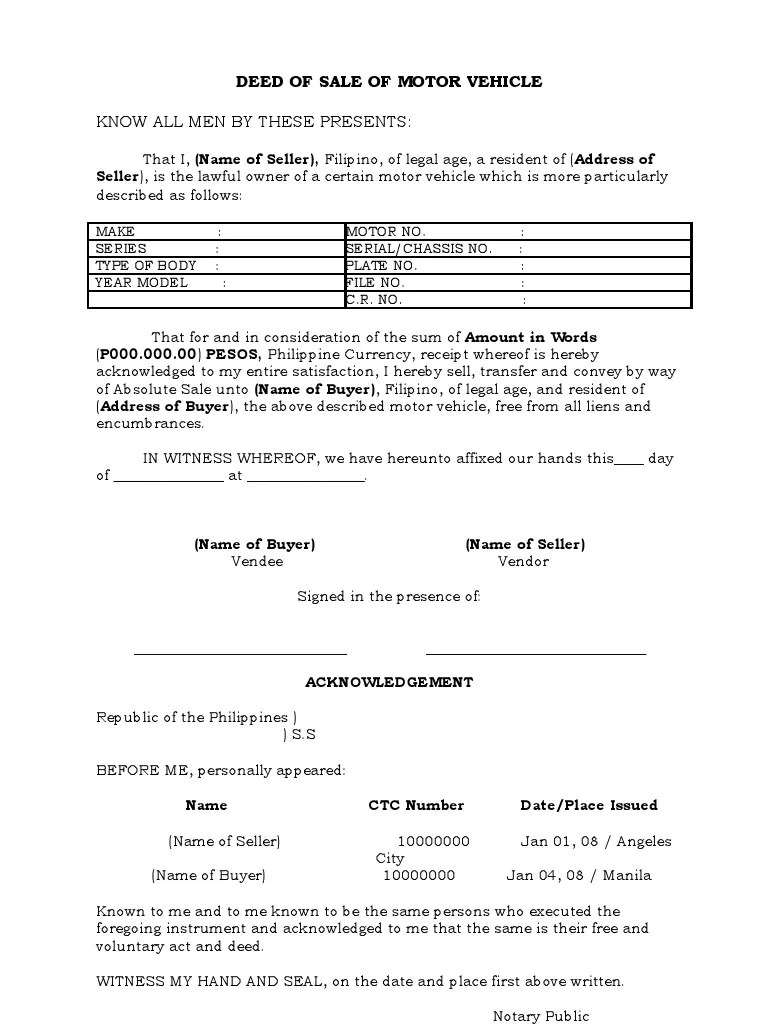Unlocking Freedom: Your Guide to Philippine Vehicle Ownership with a Deed of Sale
Imagine the wind in your hair as you cruise down a coastal highway, the sun setting over the Philippine Sea. Owning a vehicle in the Philippines can unlock incredible experiences, but it also requires careful navigation of legal paperwork. One crucial document stands between you and that open road: the Deed of Sale. This document, a seemingly simple piece of paper, is the cornerstone of legally transferring vehicle ownership in the Philippines. Don't let its simplicity fool you – a poorly executed deed of sale can lead to headaches and financial setbacks down the road.
A vehicle deed of sale in the Philippines is a legally binding contract that transfers ownership from the seller to the buyer. Think of it as the official handshake that seals the deal. This document not only confirms the transfer of ownership but also protects both parties involved. It establishes a clear record of the transaction, safeguarding both buyer and seller from potential disputes. Imagine purchasing a car only to discover later that the seller didn’t actually own it! A properly executed deed of sale prevents such nightmares.
The history of deeds of sale is deeply rooted in the need for transparent and documented transactions. Long before cars roamed the streets, similar documents were used to transfer ownership of land, livestock, and other valuable assets. In the Philippines, the legal framework surrounding deeds of sale has evolved alongside the country's legal system, incorporating provisions specific to motor vehicles. This historical context underscores the importance of this document – it’s not a modern invention but a time-tested method of ensuring a smooth transfer of ownership.
The importance of a Philippine vehicle deed of sale cannot be overstated. It's the foundation of legal ownership, the key to registering your vehicle with the Land Transportation Office (LTO), and your proof of purchase. Without a properly executed deed of sale, you can face difficulties securing insurance, renewing your registration, and even selling the vehicle in the future. It’s like building a house without a foundation – eventually, the whole structure could collapse.
Common issues with vehicle deeds of sale often stem from incomplete information, inaccurate details, or missing signatures. For example, failing to include the correct engine and chassis numbers can lead to registration problems with the LTO. Similarly, discrepancies in the stated sale price can raise red flags with tax authorities. A seemingly small oversight can snowball into a major obstacle. That’s why paying attention to detail and ensuring accuracy in every aspect of the deed of sale is paramount.
A simple example of a situation where a deed of sale is critical is when you purchase a second-hand car from a private individual. The deed of sale serves as proof that you legally acquired the vehicle from the previous owner. Without it, you'll encounter significant hurdles when trying to register the car in your name.
One benefit of a properly executed deed of sale is protection against fraud. It clearly establishes the identities of both parties and the agreed-upon terms of the sale, reducing the risk of scams or disputes. Another benefit is simplified registration with the LTO. A complete and accurate deed of sale streamlines the registration process, saving you time and effort. Finally, it provides peace of mind. Knowing that you have a legally sound document confirming your ownership gives you confidence and security.
To ensure a smooth transaction, thoroughly check all details before signing the deed of sale. Verify the seller's identity, confirm the vehicle information matches the official records, and ensure the sale price is accurately reflected. Once everything is in order, both parties should sign the document in the presence of witnesses. Finally, keep multiple copies of the signed deed of sale for your records.
Advantages and Disadvantages of Using a Standardized Deed of Sale Form
| Advantages | Disadvantages |
|---|---|
| Ease of use and readily available | May not cover all specific scenarios |
| Ensures all necessary information is included | Could be perceived as less personalized |
Frequently Asked Questions: What is a Deed of Sale? Why is it important? What information should it contain? Where can I get a sample Deed of Sale? Who needs to sign it? How many copies do I need? What happens if there are errors in the Deed of Sale? How do I register my vehicle after obtaining the Deed of Sale?
Tips: Double-check all vehicle details, ensure signatures are clear and legible, keep copies in a safe place.
In conclusion, the deed of sale for a vehicle in the Philippines is much more than just a piece of paper. It’s your passport to legal ownership, your shield against fraud, and your key to hassle-free registration. By understanding the importance of this document and following the best practices outlined above, you can ensure a smooth and secure vehicle purchase, paving the way for countless adventures on the open road. Don't underestimate the power of this seemingly simple document – it’s the foundation of your vehicle ownership journey in the Philippines. Take the time to get it right, and you’ll reap the rewards for years to come. So, grab your keys, hit the road, and enjoy the freedom that comes with knowing you've secured your ride the right way.
Decoding jp morgan chase bank savings rates your guide to maximizing returns
Unlocking nfl predictions against the spread
Unveiling the phryges a deep dive into the paris 2024 olympics mascot hat














